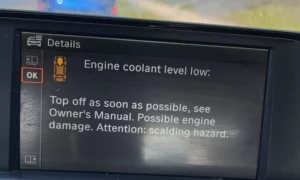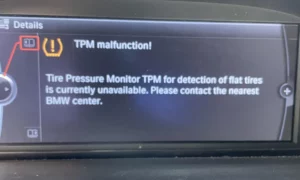The BMW level control malfunction comes up when there is a fault with the air suspension level. In addition, the level control system helps maintain the vehicle body’s height, regardless of the load condition.
High-mileage BMW vehicles, especially the older models, are common victims of “Level Control Malfunctions” as they are equipped with self-leveling or springs.
The warning message will appear for two primary reasons. The first is caused by bad air suspension springs, and the second is a faulty rear height level sensor.
Subsequently, we will discuss the meaning, symptoms, causes, and remedies to fix the BMW level control malfunction.
What are the causes of the BMW Level Control Malfunction?
If you see this warning on your BMW, it means some fault has developed with the level control system. The error message does not in itself identify what has gone wrong. But here are a couple of things that may have gone wrong.
The warning has two primary causes: a bad air suspension spring and a faulty height level sensor. Other causes include defective control modules, leaking air springs, compressors, etc.
1.Faulty height level sensor
The height level sensor collects data about the vehicle’s height and communicates it to the FRM module. Based on the data provided, the FRM module can adjust the air suspension to maintain the height threshold. If the Level control light stays on all the time, the level sensor is the fault.
2.Leaking air spring
If you get the message for a short time, after which it disappears when the engine runs, the likely cause is a leaking air spring. The air spring helps support the vehicle’s weight, adjusting the weight depending on the condition. When the air spring leaks, it causes an imbalance in the suspension system. The modules identify this imbalance and report it via a level control malfunction.
3.Defective air Suspension compressor
The air suspension compressor supplies pressurized air to the air spring or suspension system. If the compressor develops an issue, it won’t be able to supply sufficient air to the suspension system. The result is a less inflated air spring.
4.Faulty FRM Module
The FRM module controls various electrical functions in the BMW, including the headlights, signal, and interior lights. An error in the module may indirectly trigger the error message in your BMW. For instance, a malfunction with the FRM may cause it to report incorrect data to other modules, which the level control system relies on.
5.Software issue
Software issues or glitches may trigger errors within control modules that manage the level control malfunction. Since the ECU controls the interpretation of the many data collected by different systems and sensors, it may poorly interpret those data.
How to tell your air leveling suspension system is failing?
Many BMW owners may notice symptoms hint at a failing suspension system.
Below are some of the symptoms:
- BMW Level Control Malfunction warning message
- Hissing sound from air springs
- Imbalance of the car height
- Compressor fails to engage
- Compressor runs longer than usual
- Other warning messages
How to Fix the BMW Level Control Malfunction?
Below is a step-by-step guide on how to diagnose and fix the BMW Level Control Malfunction error message:
Step one: Carry out a diagnostic scan on your BMW
Connect to the OBD ii port under the dashboard using a recommended BMW scanner. Once connected, carry out a diagnostic scan of the vehicle. View the Electronic Height Control Modules (EHC) for errors. Errors include 005F8E- EHC Ride Height level Senosr, rear, and more.
Step 2: Inspect the Control unit for Corrosion or water damage
Inspect the plug control unit for damage or corrosion, which may affect communication with sensors and the level control system. If there are damages, replace the control module plug.
Step 3: Inspect the Rear Ride Height Level Sensor:
The Rear ride height level sensor is mounted on the strut assembled under the car. Inspect the condition of the sensor. Also, check the connections to and from the sensor. If any fault is discovered, replace the sensor.
Step 4: Inspect and replace the leaking air spring
Inspect the condition of the air spring for damage. Most air springs are located on the rear axle of the car. If the air spring is damaged, replace it with a new one.
Step 5: Replace the air suspension compressor
The compressor is usually attached to the car frame under the hood. It plays a principal role in the air suspension system. Check for damages to the air compressor and replace it with a new one if found.
Step 6: Perform System Update:
The error message may result from a glitch in the computer system. Perform a software update and system calibration for the ECU system when necessary.
How do you reset your BMW Self-Leveling Suspension?
Reset the BMW Self-Leveling suspension will depend on the model and year of your BMW. However, I will provide a more general method.
- Park your vehicle on a flat surface and turn off the engine.
- Connect a diagnostic tool via the BMW OBD II port
- Access the vehicle’s onboard diagnostic system.
- Search and select Chassis or Suspension from the menu.
- Select Ride Height or Self-leveling suspension calibration.
- Follow the prompt to initiate a reset
- Wait for the procedure to be completed.
- Start the engine and check if the suspension is functioning correctly.
Final word!
We understand that the “BMW Level Control Malfunction” warning message can be unpleasant news. In this article, we provided tips to help you identify the causes, symptoms, and potential fix for the warning message. We also discussed a step-by-step guide to allow you to rest your suspension system. We recommend you visit a professional mechanic if you don’t have experience dealing with diagnostic tools and do-it-yourself techniques. Thank you for reading!














